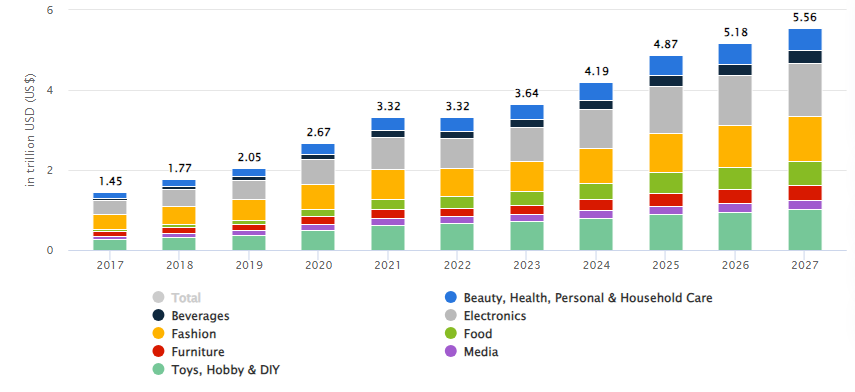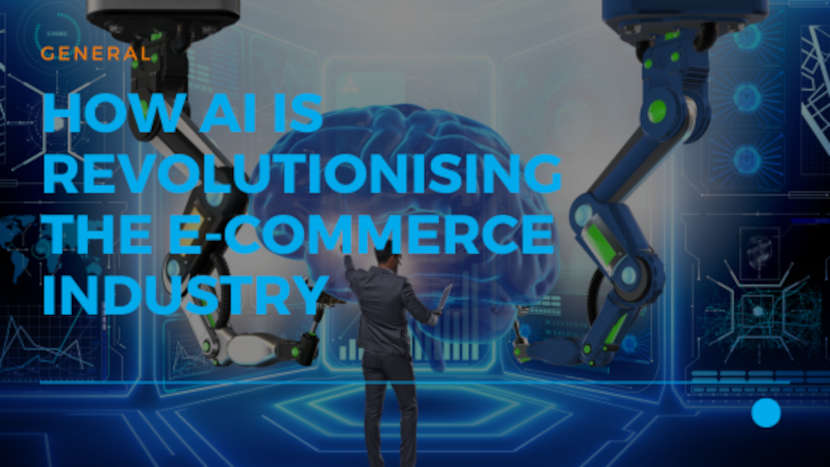The e-Commerce industry has experienced exponential growth over the past few decades. According to Statista, the global e-Commerce revenue is expected to reach almost $3.5 trillion in 2023. Given its large population and the focus on the digital economy, China holds the largest share of the revenue. It is forecasted that the value will be US$1,319.00bn in 2023.
The figure below shows the revenue per category.

Source: Statista
As the above image indicates, much of the revenue comes from electronics and fashion products. The topmost reason behind the rise of e-Commerce is internet accessibility. As internet penetration increases globally, more people are turning to the internet to buy products. Indeed, online shopping holds several benefits over in-store shopping, including convenience and extensive product range.
Artificial intelligence or AI is also playing a critical role in expanding the global e-Commerce market. AI refers to the simulation of human intelligence in machines that can perform tasks typically requiring human intelligence, such as learning and decision-making. Undoubtedly, AI is a disruptive technology. The most recent example is Chat-GPT which has gained considerable popularity since its introduction.
AI in the e-Commerce Industry
In the context of e-Commerce, AI utilises algorithms and data analysis to automate and optimise various processes. The ultimate goal of introducing AI in e-Commerce is to enhance the customer experience and to streamline business processes. It is why you will see every best web development company rushing to introduce AI-features in their apps and websites.
This article delves into how AI is transforming the e-Commerce industry. The article will list several use cases for better understanding.

AI – Transforming e-Commerce
1. Personalised Shopping Experience
The most notable use of AI is in personalising the shopping experience. The top eCommerce websites analyse customer data, including purchase history and website browsing behaviour. They use this data to create individual customer profiles and then suggest products that align with individual preferences. If you are wondering about the success rate of such algorithms, look no further.
A McKinsey report mentions that Amazon drives 35% of sales from its AI recommendation algorithm. Likewise, Netflix states that 75% of the content which viewers watch on Netflix is from recommendations. There are multiple ways AI suggests products. For instance, based on users’ similarities and preferences, items liked by one user are recommended to others.
2. Enhanced Customer Service
With the proliferation of e-Commerce stores globally, e-Commerce stores rely upon the quality of customer service to differentiate themselves. AI-driven chatbots and virtual assistants are instrumental in providing real-time customer support. They are more than capable of handling common inquiries, processing orders, and even providing recommendations based on customer data.
The best thing about these AI-chatbots is they are available 24/7. Regardless of when a customer posts their query, the AI-bot provides a prompt response. Only complex queries that require human attention are transferred to human representatives. As these bots are capable of handling multiple languages, it allows the e-Commerce store to expand its reach.
3. Supply Chain and Inventory Management
The pandemic has highlighted the importance of supply chain and inventory management. As soon as China went into lockdown, global supply chains were disrupted. Businesses were left without enough stock to meet customer demands. AI can be quite helpful in this area. AI-powered demand forecasting models analyse data such as past sales and market trends to predict future demand accurately.
How does it benefit a business? By accurately predicting demand, businesses can minimise under and overstocking. It leads to cost savings and ensures customers always have access to the desired products. AI-driven predictive analytics can also help businesses anticipate supply chain disruptions, such as delays or stock shortages. It helps them adopt proactive practices to minimise disruptions.
4. AI-driven Pricing Strategies
With so many e-Commerce stores competing in the same niche, pricing can play a critical role in customer acquisition and retention. Previously, store owners used to manually scrape competitor websites to analyse their prices. They priced their own products based on this analysis. There are numerous apps available for the web scraping, thereby reducing manual work.
AI goes one step further when it comes to pricing strategies. AI allows businesses to implement dynamic pricing strategies, where product prices fluctuate based on factors like demand, competition, time of day, and customer behaviour. It allows the online store to respond to ever-changing market conditions promptly. It is a great way to achieve and build upon your competitive advantage.
5. Fraud Detection
Ask any WordPress web development company or a web development expert and they will agree that fraud is a significant challenge. For instance, cybercriminals use stolen information to make purchases. Not every online store has insurance to cover fraud-related costs. But what they can do is rely upon the power of AI to combat fraud and ensure greater security.
It can boost customer confidence in their store, ultimately driving sales. AI algorithms can analyse various data points, such as transaction history, user behaviour, and location, to flag a fraudulent transaction. For example, a customer makes 3 orders in a month for the past 6 months and all from the same location. Suddenly, they place 10 orders of products that are quite different from their previous purchases.
The AI algorithm will flag this transaction, meaning it will put it on hold until further verification. By continuously learning from new data, these systems improve their accuracy and effectiveness over time. Over time, the e-Commerce store will develop a strong reputation as a reliable platform. It will be beneficial in ensuring repeat customers, ultimately benefiting the store’s revenue.
6. AI in Marketing
AI is a powerful tool in providing a personalised experience to the visitors. Similarly, it offers considerable benefits in marketing. After analysing vast amounts of customer data, it can help deliver targeted advertisements to the right audience. It improves the return on ad spend and fosters better engagement. When customers only see ads for relevant products, they are more likely to go through with the purchase.
For example, many businesses are now using AI for managing their social media accounts. The AI algorithm analyses customer posts, comments, and more to determine the customer sentiment. Based on this analysis, the e-Commerce store can create personalised posts. A lot of businesses have now linked their AI tools with Chat-GPT to automate responses to customer posts and comments.

Ethical Considerations and Challenges
While AI offers numerous benefits to online stores, it is not without challenges. The foremost challenge when it comes to AI is data privacy and user consent. As AI tools analyse vast amounts of data, it is imperative for the e-Commerce store to obtain user consent first. while it may seem easy, it is quite the opposite. The store must first explain which data it is obtaining and for what purpose they plan to use it.
Customers do not have the technical know-how to understand the technical jargon. Businesses must be transparent with their data practices and provide customers with control over their data. Lastly, the human element must not be ignored. Businesses need to maintain a balance between AI and human intervention for providing a truly unique customer experience.

Conclusion
Undoubtedly, AI is a blessing for the e-Commerce industry as it provides numerous benefits. It can create personalised shopping experiences and enhance the effectiveness of the store’s inventory management system. While AI offers immense benefits, it also presents challenges that must be addressed proactively. Indeed, responsible AI implementation is the key for true success.

Mansoor Khattak
Tech Indexer“I am Mansoor Khattak, a professional SEO expert with 4 years of experience. I manage various blogs, business websites, and work across multiple SEO domains.”

